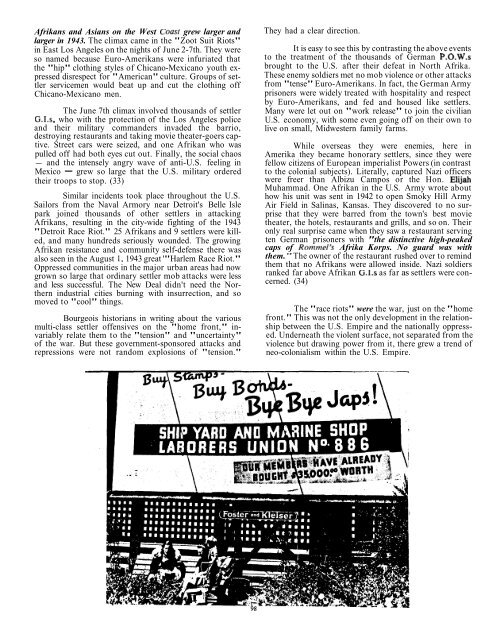Settlers - San Francisco Bay Area Independent Media Center
Settlers - San Francisco Bay Area Independent Media Center
Settlers - San Francisco Bay Area Independent Media Center
Create successful ePaper yourself
Turn your PDF publications into a flip-book with our unique Google optimized e-Paper software.
Afrikans and Asians on the West Coast grew larger and<br />
larger in 1943. The climax came in the "Zoot Suit Riots"<br />
in East Los Angeles on the nights of June 2-7th. They were<br />
so named because Euro-Amerikans were infuriated that<br />
the "hip" clothing styles of Chicano-Mexicano youth expressed<br />
disrespect for "American" culture. Groups of settler<br />
servicemen would beat up and cut the clothing off<br />
Chicano-Mexicano men.<br />
The June 7th climax involved thousands of settler<br />
G.I.s, who with the protection of the Los Angeles police<br />
and their military commanders invaded the barrio,<br />
destroying restaurants and taking movie theater-goers captive.<br />
Street cars were seized, and one Afrikan who was<br />
pulled off had both eyes cut out. Finally, the social chaos<br />
- and the intensely angry wave of anti-U.S. feeling in<br />
Mexico - grew so large that the U.S. military ordered<br />
their troops to stop. (33)<br />
Similar incidents took place throughout the U.S.<br />
Sailors from the Naval Armory near Detroit's Belle Isle<br />
park joined thousands of other settlers in attacking<br />
Afrikans, resulting in the city-wide fighting of the 1943<br />
"Detroit Race Riot." 25 Afrikans and 9 settlers were killed,<br />
and many hundreds seriously wounded. The growing<br />
Afrikan resistance and community self-defense there was<br />
also seen in the August 1, 1943 great '"Harlem Race Riot."<br />
Oppressed communities in the major urban areas had now<br />
grown so large that ordinary settler mob attacks were less<br />
and less successful. The New Deal didn't need the Northern<br />
industrial cities burning with insurrection, and so<br />
moved to "cool" things.<br />
Bourgeois historians in writing about the various<br />
multi-class settler offensives on the "home front," invariably<br />
relate them to the "tension" and "uncertainty"<br />
of the war. But these government-sponsored attacks and<br />
repressions were not random explosions of "tension."<br />
They had a clear direction.<br />
It is easy to see this by contrasting the above events<br />
to the treatment of the thousands of German P.0.W.s<br />
brought to the U.S. after their defeat in North Afrika.<br />
These enemy soldiers met no mob violence or other attacks<br />
from "tense" Euro-Amerikans. In fact, the German Army<br />
prisoners were widely treated with hospitality and respect<br />
by Euro-Amerikans, and fed and housed like settlers.<br />
Many were let out on "work release" to join the civilian<br />
U.S. economy, with some even going off on their own to<br />
live on small, Midwestern family farms.<br />
While overseas they were enemies, here in<br />
Amerika they became honorary settlers, since they were<br />
fellow citizens of European imperialist Powers (in contrast<br />
to the colonial subjects). Literally, captured Nazi officers<br />
were freer than Albizu Campos or the Hon. Elijah<br />
Muhammad. One Afrikan in the U.S. Army wrote about<br />
how his unit was sent in 1942 to open Smoky Hill Army<br />
Air Field in Salinas, Kansas. They discovered to no surprise<br />
that they were barred from the town's best movie<br />
theater, the hotels, restaurants and grills, and so on. Their<br />
only real surprise came when they saw a restaurant serving<br />
ten German prisoners with "the distinctive high-peaked<br />
caps of Rornmel's Afrika Korps. No guard was with<br />
them. " The owner of the restaurant rushed over to remind<br />
them that no Afrikans were allowed inside. Nazi soldiers<br />
ranked far above Afrikan G.1.s as far as settlers were concerned.<br />
(34)<br />
The "race riots" were the war, just on the "home<br />
front." This was not the only development in the relationship<br />
between the U.S. Empire and the nationally oppressed.<br />
Underneath the violent surface, not separated from the<br />
violence but drawing power from it, there grew a trend of<br />
neo-colonialism within the U.S. Empire.

















